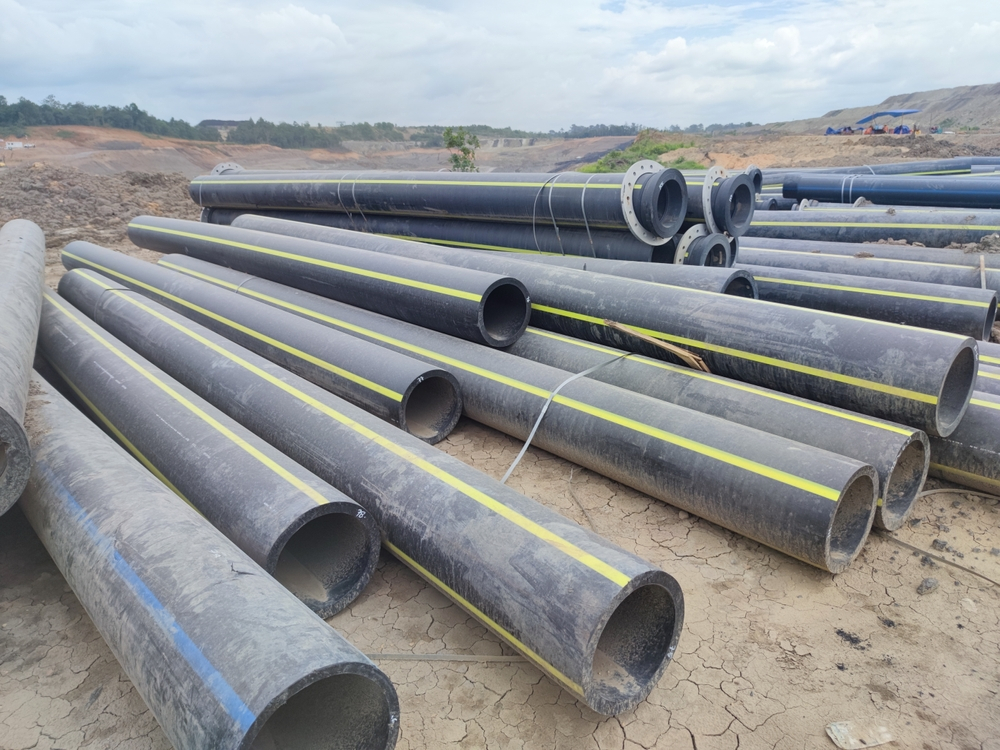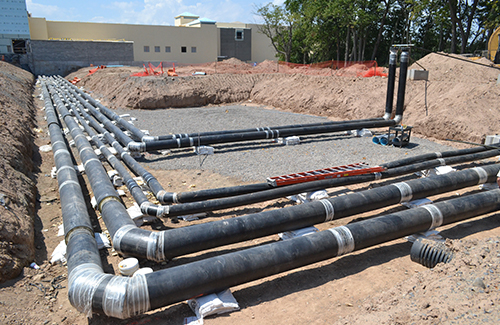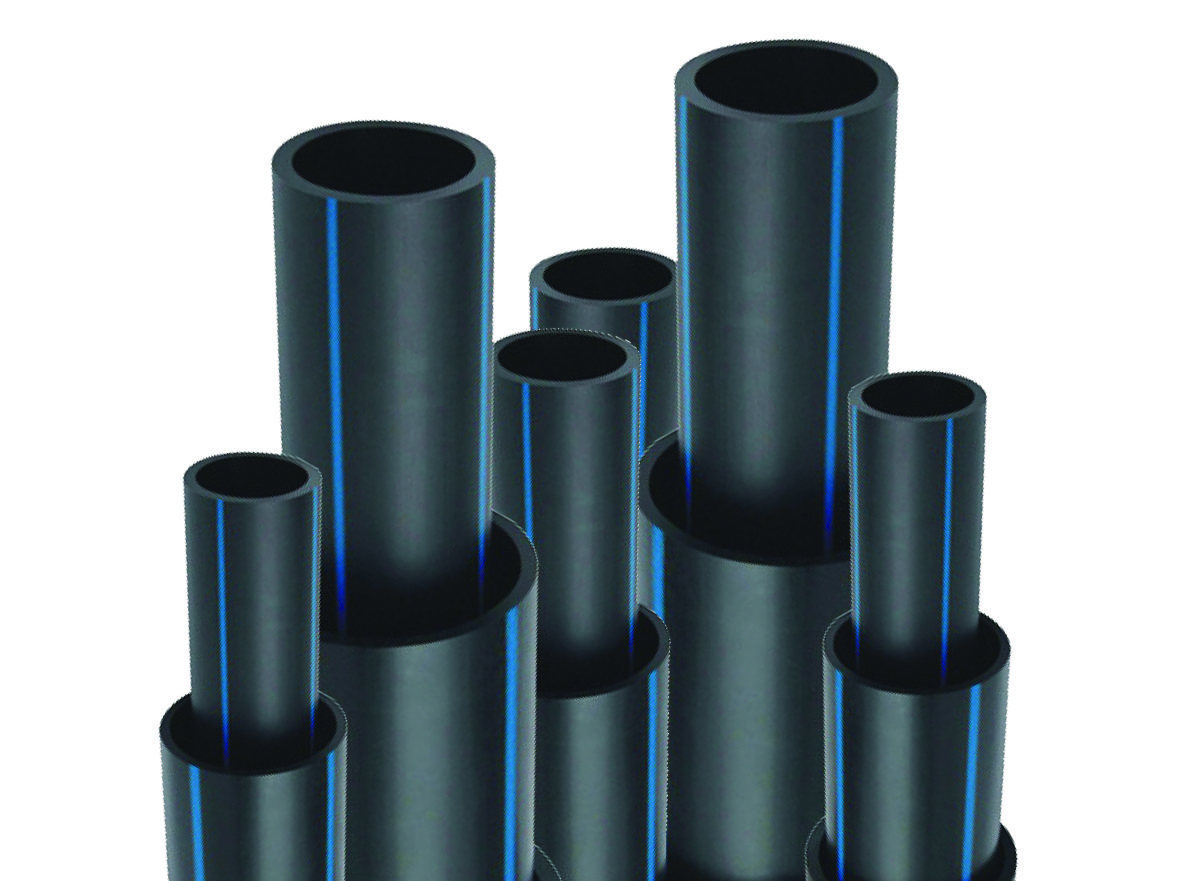The ultimate guide to selecting the best HDPE Pipe Supplier
Pipeline Manufacturer Spotlight: Discover the most effective in the Industry for Your Following Job
In the domain name of pipeline manufacturing, the choice of producer can considerably impact the result of your job. With a range of companies offering ingenious solutions and sophisticated materials, comprehending the essential criteria for choice becomes important. Industry leaders like Tenaris, Vallourec, and U.S. Steel are at the center of supplying sustainable and dependable alternatives. The concern stays: what specific aspects should lead your decision-making procedure, and how do these suppliers distinguish themselves in a significantly competitive market? Checking out these elements may disclose understandings that can influence your following task's success.
Industry Overview
In the pipeline manufacturing field, there exists a dynamic interplay of technological developments and governing demands that shapes industry practices. This market is important for the transportation of oil, gas, water, and other liquids, demanding a robust understanding of both material residential properties and ecological influences. Manufacturers are significantly integrating advanced materials and cutting-edge manufacturing strategies to boost the durability and efficiency of pipes, guaranteeing they can stand up to differing pressures and ecological conditions.

Additionally, the surge of digital modern technologies has transformed conventional manufacturing procedures, enabling improved surveillance and anticipating upkeep. This shift not only improves operational effectiveness however also aids in mitigating potential failings prior to they escalate right into important issues. In general, the landscape of pipeline manufacturing is identified by a continuous development driven by development and conformity, placing the field for future development and sustainability.
Key Criteria for Selection
Choosing the appropriate pipeline producer includes cautious factor to consider of numerous key criteria that ensure integrity, efficiency, and conformity with sector criteria. Analyze the manufacturer's experience and reputation within the industry. A well-established company with a proven track record is more likely to deliver top quality services and products.
Next off, review the variety of products and specs provided. Manufacturers ought to offer a variety of options that accommodate varied task requirements, including different pipeline dimensions, products, and finish systems. Compliance with relevant industry criteria, such as ASTM or API, is crucial, as it assures the items satisfy safety and efficiency criteria.
Additionally, consider the supplier's technological capabilities. Advanced manufacturing methods and high quality control measures can greatly influence the toughness and performance of the pipes. Customer care and assistance are also critical; a knowledgeable and receptive team can promote smoother job execution and resolve any type of concerns without delay.
Analyze prices structures and lead times. While cost-effectiveness is necessary, it should not endanger quality. Balancing these standards will bring about a knowledgeable decision that lines up with project goals and regulative requirements.
Top Pipeline Manufacturers
In the affordable landscape of pipeline manufacturing, several market leaders attract attention for their ingenious modern technologies and commitment to sustainability. These top suppliers not only master supplying top quality items but also focus on eco responsible methods in their procedures. A review of their contributions offers useful understandings into the future of pipeline services.
Market Leaders Review
How do market leaders form the pipeline manufacturing landscape? The leading pipeline suppliers play a vital function in establishing market criteria, driving technology, and guaranteeing quality control throughout the supply chain. Business such as Tenaris, Vallourec, and united state Steel have actually established benchmarks for sustainability, performance, and security, affecting not simply their procedures yet additionally their rivals.
These leaders spend substantially in study and growth to boost item longevity and performance. Their dedication to sticking to regulative compliance and global standards promotes customer depend on and encourages industry-wide adoption of best techniques. They typically team up with stakeholders, consisting of engineers and construction companies, to ensure that their products meet specific task demands and environmental factors to consider.
Market leaders also prioritize consumer connections, offering customized services and extraordinary service, which reinforces their market setting. By leveraging economies of range, they can provide affordable pricing without endangering high quality. Ultimately, the impact of these manufacturers prolongs beyond their items; they shape the future of pipeline innovation and manufacturing processes, ensuring a sustainable and resistant facilities for numerous industries worldwide.
Cutting-edge Technologies Provided
What innovative innovations are changing the pipeline manufacturing industry? Over the last few years, leading pipeline producers have actually embraced sophisticated modern technologies to enhance effectiveness, integrity, and safety in their procedures. One substantial development is the combination of clever pipeline surveillance systems, utilizing Net of Points (IoT) sensors. These systems offer real-time information on pipeline problems, making it possible for positive upkeep and lowering the risk of failings or leakages.
Additionally, producers are significantly taking on advanced materials, such as composite pipes, which use boosted resilience and resistance to rust. These materials not only prolong the life expectancy of pipes yet additionally lower functional prices over time. Furthermore, additive manufacturing, or 3D printing, is reinventing the manufacturing process. This technology permits rapid prototyping and customization of elements, enhancing supply chains and minimizing waste.
Man-made intelligence (AI) and artificial intelligence algorithms are likewise acquiring traction, optimizing layout procedures and anticipating maintenance routines. By evaluating vast datasets, these technologies aid recognize prospective problems before they arise, boosting security and operational performance. As these innovative technologies proceed to develop, they guarantee to shape the future of pipeline manufacturing, ensuring that projects can be finished promptly and within budget plan while maintaining miraculous security requirements.
Sustainability Practices Highlighted
The continuous improvements in ingenious modern technologies within the pipeline manufacturing sector are enhanced by an expanding emphasis on sustainability techniques among leading manufacturers. These business are increasingly taking on green techniques, decreasing waste, and decreasing their carbon impacts throughout the manufacturing process.
Leading suppliers are prioritizing the usage of recycled materials, boosting the lifecycle of their products. By applying closed-loop systems, they efficiently make use of resources, consequently diminishing the ecological influence connected with raw product extraction and processing. In addition, numerous companies are purchasing renewable resource resources to power their operations, additionally reducing greenhouse gas emissions.
Moreover, pipeline producers are welcoming advanced finishings and products that improve rust resistance and durability, which inevitably decreases the frequency of replacements and fixings. These sustainable methods not only add to ecological stewardship however additionally straighten with the expanding governing needs and market assumptions for responsible manufacturing.
Furthermore, collaboration with stakeholders to foster sustainability initiatives showcases a commitment to a greener future. By concentrating on sustainable practices, top pipeline manufacturers are not only boosting their functional performance yet additionally establishing a criteria for market requirements, promoting a more sustainable pipeline infrastructure for all.
Cutting-edge Technologies
The pipeline sector is observing a transformative change via the assimilation of ingenious innovations, particularly in advanced materials development and clever pipeline tracking systems. These improvements not just enhance the longevity and efficiency of pipelines yet additionally improve security and ecological stewardship. As suppliers accept these innovative services, the future of pipeline infrastructure looks significantly appealing.
Advanced Materials Growth
Developments in advanced products development are revolutionizing the pipeline manufacturing sector, driving enhancements in efficiency, performance, and longevity. The introduction of composite products and high-strength alloys has actually allowed the manufacturing of pipes that can stand up to severe conditions, consisting of high stress and corrosive settings. These materials not only expand the lifespan of pipelines however additionally decrease upkeep costs, eventually bring about improved operational effectiveness.

Improvements in polymer scientific research have actually led to the production of light-weight, adaptable piping systems that are easier to install and transfer. These advancements add to reduce carbon footprints in pipeline jobs, straightening with worldwide sustainability objectives. Additionally, the combination of nanotechnology in product advancement is opening brand-new methods for boosting the mechanical residential properties of standard products, leading to pipes that can endure greater stress and anxiety while keeping honesty.
As makers remain to purchase r & d, the pipeline sector is experiencing an extraordinary development in material capabilities. This concentrate on sophisticated materials not just sustains the growing demand for trusted framework but additionally promotes a competitive landscape in which business can differentiate themselves via remarkable product offerings. The future of pipeline manufacturing is absolutely linked with these groundbreaking developments.
Smart Pipeline Keeping Track Of Equipments
Smart pipeline tracking systems are transforming the landscape of pipeline monitoring by integrating sophisticated innovations such as IoT sensors, expert system, and real-time information analytics. HDPE Pipe Supplier. These systems enable drivers to monitor the stability and performance of pipes continuously, substantially decreasing the threat of failures and leakages
Via the implementation of IoT sensing units along pipeline routes, drivers collect vital information on temperature level, flow, and stress prices. This information is transmitted in real-time to centralized surveillance systems, enabling instant analysis and response to anomalies. Advanced fabricated intelligence algorithms examine this information to identify patterns, forecast potential issues, and suggest preventative measures before they intensify right into pricey problems.
The application of wise tracking systems not just boosts functional efficiency but likewise promotes conformity with governing criteria. By giving detailed reports and insights, these innovations support much better decision-making and danger administration. Furthermore, the combination of maker understanding capacities makes it possible for systems to enhance over time, adapting to changing conditions and enhancing anticipating precision.
As the sector proceeds to accept these advancements, wise pipeline tracking systems are poised to play a critical role in guaranteeing the safety, reliability, and sustainability of pipeline infrastructure. HDPE Pipe Supplier.

Instance Studies of Success
Success tales within the pipeline manufacturing market illuminate the efficiency of innovative remedies and partnership amongst stakeholders. One noteworthy instance is the partnership in between a leading maker and an oil company to carry out a state-of-the-art clever pipeline monitoring system. The task considerably lowered leak discovery times and improved operational performance, showcasing the value of sophisticated technology in improving dig this safety and security and decreasing expenses.
Another example entails a manufacturer that effectively incorporated sustainable materials right into their pipeline building and construction. By collaborating with research study establishments, they developed a composite material that is not just durable but likewise eco pleasant. This development not only satisfied governing requirements however additionally brought in new clients seeking lasting remedies.
Furthermore, a pipeline job in a difficult geographical area showed the relevance of adaptive engineering techniques. The supplier teamed up with local designers to design a pipeline that could endure extreme weather condition problems, ultimately avoiding service interruptions and guaranteeing dependability for end-users.
These study exemplify how tactical partnerships, technological advancements, and flexible remedies in the pipeline manufacturing field cause effective job outcomes, thereby reinforcing the sector's dedication to providing premium facilities while dealing with client requires successfully.
Sustainability Practices
As the pipeline manufacturing sector progresses, the integration of sustainability techniques has come to be progressively important. Manufacturers are embracing environmentally friendly products and processes to decrease their environmental influence while preserving high criteria of high quality and safety and security. This shift is driven by both governing requirements and a growing recognition of environmental duty among stakeholders.
One famous approach is making use of recycled products in pipeline production, which lowers the demand for virgin resources and lowers waste. Companies are likewise purchasing energy-efficient manufacturing techniques, consequently lowering their carbon footprint throughout manufacturing. Additionally, lots of suppliers have embraced water preservation practices, guaranteeing that water use is minimized and wastewater is treated successfully.
Lasting transport approaches are being made use of to deliver materials, including maximizing logistics to lower emissions. The commitment to lifecycle assessments enables makers to examine the ecological impact of their products from inception to disposal, promoting not only sustainability but also lasting financial stability.
Eventually, the adoption of sustainability practices in pipeline manufacturing represents an important step toward lining up industry operations with global environmental goals, making sure that future jobs are both innovative and accountable - HDPE Pipe Manufacturing Texas. - HDPE Pipe Supplier
Future Patterns in Pipeline Manufacturing
What innovations are on the perspective for pipeline manufacturing? As the industry progresses, a number of crucial patterns are forming the future of pipeline production. The assimilation of sophisticated materials such as composite pipes promises enhanced durability and resistance to deterioration, consequently extending the life expectancy of pipelines. These materials not just lower maintenance expenses but also enhance safety and security requirements.

Sustainability stays a critical focus, with suppliers increasingly prioritizing green practices. The advancement of naturally degradable products and the implementation of recycling programs are acquiring grip, straightening with international ecological goals.
Frequently Asked Questions
What Materials Are Frequently Utilized in Pipeline Manufacturing?
Usual products used in pipeline manufacturing include carbon steel, stainless-steel, polyethylene, and pliable iron (HDPE Pipe Manufacturing Texas). Each product offers unique advantages concerning stamina, deterioration resistance, and viability for various applications within the pipeline industry
How much time Does the Pipeline Manufacturing Refine Commonly Take?
The pipeline manufacturing procedure commonly varies from a few weeks to a number of months, relying on variables such as product option, production capacity, and customization requirements. Efficient planning and coordination can significantly influence the overall timeline.
What Are the A Lot Of Common Pipeline Sizes Available?
One of the most usual pipeline dimensions vary from 2 inches to 48 inches in size. Variability exists based on particular applications, industry criteria, and local demands, making sure versatility to satisfy diverse project needs and functional demands.
Exist Service Warranties Used on Pipeline Products?
Yes, several pipeline makers use guarantees on their products, typically covering material problems and workmanship. The period and regards to these warranties differ by supplier, so it is important to examine details plans before acquisition.
Exactly how Do I Guarantee Proper Installment of Pipelines?
To assure correct setup of pipes, follow market criteria, use qualified specialists, carry out comprehensive website evaluations, implement quality assurance steps, and secure conformity with policies. Normal evaluations and upkeep even more boost pipeline performance and long life.
Pipeline makers are welcoming sophisticated coatings and products that improve rust resistance and long life, which eventually lowers the frequency of replacements and fixings. The pipeline market is observing a transformative shift with the assimilation of ingenious modern technologies, particularly in sophisticated products development and wise pipeline surveillance systems. As producers proceed to spend in research study and growth, the pipeline industry is experiencing an extraordinary evolution in material capacities. Smart pipeline monitoring systems are transforming the landscape of pipeline administration by incorporating sophisticated technologies such as IoT sensors, man-made knowledge, and real-time information analytics. Yes, many pipeline producers use service warranties on their items, typically covering material flaws and handiwork.